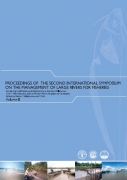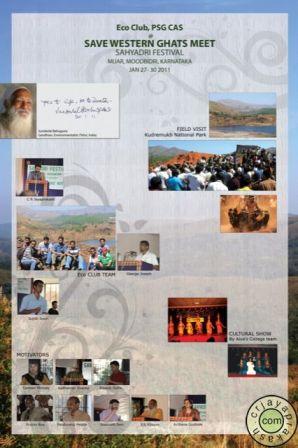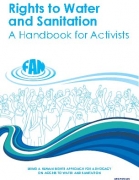/topics/ecology-and-environment
Ecology and Environment
National Seminar on Mining of River Sand and its Impacts on the Environment, CWRDM, 18th & 19th February 2011, Kozhikode, Kerala
Posted on 04 Feb, 2011 11:28 AMTheme: Adverse impacts of uncontrolled sand mining in the rivers
Organizer: Center for Water Resources Development and Management (CWRDM)
Venue: Kozhikode, Kerala
Wetlands (Conservation and Management) Rules 2010 - Welcome, but a lost opportunity - Press release by SANDRP
Posted on 04 Feb, 2011 10:33 AMOn the occasion of the World Wetlands Day 2011, while we welcome the notification of Wetland (Conservation and Management) rules 2010 by the Union Ministry of Env
Proceedings of the second international symposium on the management of large rivers for fisheries by FAO and Mekong River Commission
Posted on 03 Feb, 2011 07:55 PM The second international symposium on the management of large rivers for fisheries was held by the Food and Agriculture Organisation of the United Nations (FAO) and Mekong River Commission on 11 - 14 February 2003 in Phnom Penh, Kingdom of Cambodia. It had three primary objectives: (a) To provide a forum to review and synthesise the latest information on large rivers; (b) To raise the political, public and scientific awareness of the importance of river systems, the living aquatic resources they support and the people that depend on them; and (c) To contribute to better management, conservation and restoration of the living aquatic resources of large rivers.
The second international symposium on the management of large rivers for fisheries was held by the Food and Agriculture Organisation of the United Nations (FAO) and Mekong River Commission on 11 - 14 February 2003 in Phnom Penh, Kingdom of Cambodia. It had three primary objectives: (a) To provide a forum to review and synthesise the latest information on large rivers; (b) To raise the political, public and scientific awareness of the importance of river systems, the living aquatic resources they support and the people that depend on them; and (c) To contribute to better management, conservation and restoration of the living aquatic resources of large rivers.
The symposium was organised in six sessions:
Session 1: Status of rivers
Session 2: Value of river fisheries
Session 3: Fisheries ecology and conservation
Session 4: Management of river fisheries
Session 5: Statistics and information
Session 6: Synthesis
It came up with the following recommendations for action -
- Improve the valuation of living river resources in order to contribute to equitable and sustainable management of fishery resources and properly place the fishery in the context of the other uses of rivers.
- Direct greater effort to better understanding the social and economic aspects of fisheries to support policy and management priorities; livelihood approaches will be a valuable tool.
- Communicate and engage with environment and water resources managers within the context of multi-use of water in order to accurately assess impacts and to sustain the benefits of river fisheries in an equitable manner.
- Develop processes that facilitate the users and beneficiaries of the fishery resource to assume greater control of its management.
- Establish appropriate mechanisms at national and basin level to enable negotiation for the needs of communities dependent upon the living aquatic resources. In particular further regulations need to be elaborated to protect general ecosystem function and provide for environmental flows.
- Use instruments such as the freshwater eco-regions approach, the Ramsar Convention and the guidelines for water allocation suggested by the World Commission on Dams, to enhance planning for conservation and sustainable use of river habitats.
- Incorporate ecological flow requirements of river-floodplain systems into development plans and impact assessments that affect river flows, taking into account the seasonality of the system and the environmental cues needed by the fish for migration and reproduction.
- Rehabilitate degraded ecosystems wherever possible. Prioritize schemes that ensure connectivity and protection of critical habitats.
Mapping ecologically sensitive, significant and salient areas of Western Ghats: Proposed protocols and methodology by Western Ghats Ecology Expert Panel of the MoEF - An article from Current Science
Posted on 02 Feb, 2011 08:11 PMThe Western Ghats Ecology Expert Panel (WGEEP) of the Ministry of Environment and Forests, Government of India (GOI) had been asked to identify ESAs along the Western Ghats, and to suggest how to manage them. The concept of ESAs has been extensively discussed in the literature. Several ESAs have been set up in India over the last 22 years under the Environment Protection Act, 1986, and a GOI committee under the chairmanship of Pranob Sen has proposed certain criteria for identification of ESAs.
A report on Save Western Ghats Meet held at Moodbidri, Mangalore between 27th -30th January 2011
Posted on 02 Feb, 2011 03:11 PM
Remote sensing applications: A book by NRSC (2010)
Posted on 01 Feb, 2011 05:52 PM
The book covers 16 chapters addressing various applications starting with introduction, state of art technology, case studies, literature review, future trends besides providing relevant references which are more useful for operational scientists and researchers. The resource scientists from Remote sensing & GIS applications area have contributed these chapters.
Right to water and sanitation - A handbook for activists by Freshwater Action Network (FAN) Global
Posted on 31 Jan, 2011 10:11 PM With tihs, they can improve water and sanitation service regulation and provision at international, national and local levels. Directed primarily at community groups, human rights NGOs, rights-based development practitioners and aid workers, this handbook aims to strengthen human rights-based advocacy by providing innovative and practical suggestions that activists and organisations can use in their work. It also acts as a resource guide for finding further information.
With tihs, they can improve water and sanitation service regulation and provision at international, national and local levels. Directed primarily at community groups, human rights NGOs, rights-based development practitioners and aid workers, this handbook aims to strengthen human rights-based advocacy by providing innovative and practical suggestions that activists and organisations can use in their work. It also acts as a resource guide for finding further information.
Water and sanitation are essential for living a healthy life with dignity. However, around a billion people across the world lack access to a safe and sufficient water supply to cover their basic needs. Over 2.5 billion people lack access to adequate sanitation and nearly 1.2 billion face the indignity of open defecation every day.
The Millennium Development Goal (MDG) target to halve the proportion of people without sustainable access to safe drinking water and basic sanitation by 2015 is seriously off track, with sanitation severely lagging behind. For example, estimates suggest that at current rates of progress, sub-Saharan Africa will miss the MDG water target by about 25 years, while the sanitation target may not be reached until well into the 22nd century.
Applicability of traditional wisdom in water management in Konkan region of Maharashtra - Paper presented at the National Seminar on Water and Culture (2007)
Posted on 31 Jan, 2011 02:51 AMThe state government's investments in supplying potable water under the Maharashtra Jeevan Pradhikaran (MJP) scheme which envisaged a no tanker supply' end to the scheme is critiqued. The authors note that the project mainly concentrated on asset creation, neglecting operation and maintenance resulting in limited improvement in villages, with respect to water supply.
India's participation at the UN Climate Change Conference at Cancun, Mexico - MoEF press release and ninister's statement
Posted on 31 Jan, 2011 12:16 AMContent Courtesy: Ministry of Environment and Forests, Government of India
Press release: Indian event at Cancun re-emphasises importance of equity, 7th December 2010
India hosted a major event at the sidelines of the UN Climate Change Conference at Cancun, where the critical issue of equity and equitable access to carbon space was emphasised.
India's Minister for Environment and Forests and Head of Delegation, Shri Jairam Ramesh personally chaired the side event that had presentations by Prof. T. Jayaraman, Tata Inst. Of Social Sciences, India, Mr. Martin Khor, Executive Dir., South Centre, Geneva and Dr. Harald, ERC & Univ. Of Cape Town, South Africa.
Download the entire press release here.





